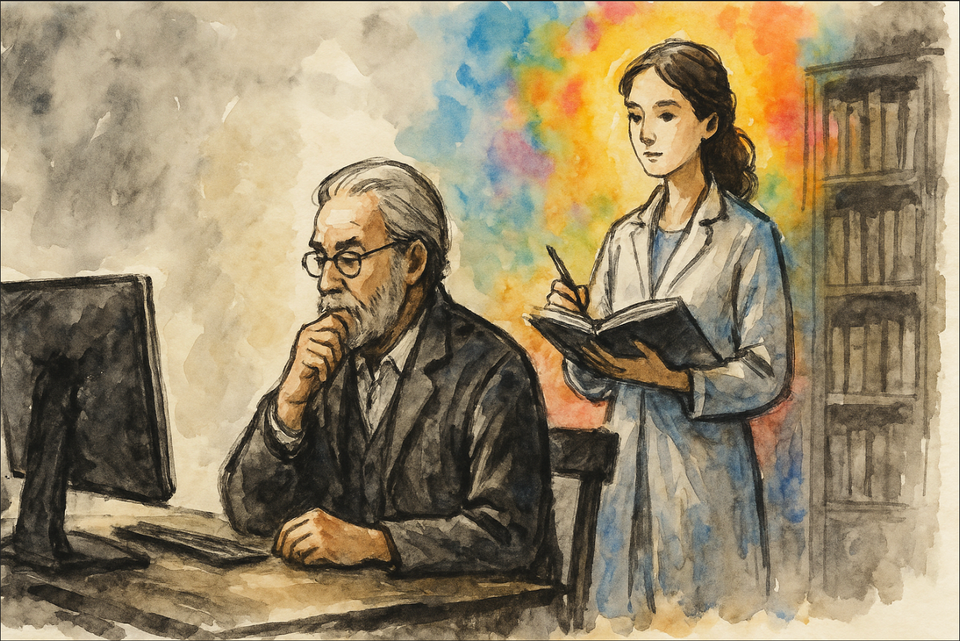Reviewer #2 Was... A PhD Student

In the 20th century, Tom Clancy’s espionage novels became so popular that his publisher started hiring ghostwriters to respond to the popular demand. But in science, such a thing would be unthinkable, right? No one should contribute to a research paper and not receive their due credit. In peer reviewing, however…
Everyone in academia knows it happens, but it’s treated like the problem that-shall-not-be-named. The truth is that, in many contexts, PIs end up delegating the task of reviewing a manuscript to a postdoc or PhD student. This doesn't need to be, in itself, a bad thing. It can indeed be a good opportunity for early-stage researchers to grasp how to critically assess research work. It’s the lack of credit that makes this a concerning topic.
And so, many postdocs and PhD students end up becoming ghost reviewers.
“A learning opportunity”
Sure, knowing how to peer review is a very important skill to develop as a student. And acting as a co-peer reviewer can be a good opportunity to do so. But the same “it’s a skill development” mindset can be applied to pretty much everything in academia. PhD students are students who are learning, and they still get responsibility and credit for their lab work or data analysis contribution in research papers. Why would it be different when they are reviewers?
And besides, the “learning” argument builds on the premise that students are actually mentored during the process. Which is, as we very well know, not always the case. Many “learning” reviewers' work doesn’t even get properly double-checked or get feedback from the “senior” reviewer before being sent.
Working for free
Peer review is unpaid labor, no matter your career stage (and that is a whole new discussion, which we can gladly have some other time).
But doing it for free and without credit? That sounds like a terrible deal.
Besides, one can argue that peer reviewing is part of the obligations one accepts when getting a senior position. With the great power of less lab work come the greater senior responsibilities of reviewing, management, and supervision.
However, this is not part of the deal for students, whose responsibilities include all the bench work, data analysis, reading, and writing. And, again, especially if they are not given due credit.
Who actually reviewed my manuscript?
This issue ends up possibly undermining the structure of the peer review system itself. If we know ghost reviewing by junior researchers is such a common thing, it’s logical to question the origin of the reviewer comments that we got on our own manuscripts. And whether the senior reviewer ever contributed to it at all...
The thing is, the contribution of a junior researcher to the reviewing of a manuscript can be quite valuable. Senior researchers might tend to focus on the general conceptual perspective of a manuscript (which is completely valid, yes). However, the more technical aspects directly related to experimentation might escape their scrutiny.
With all due respect, some newer techniques or technologies might be... let's say... less familiar to some (Yeah, yeah, cancel me for ageism. I need vacation anyway.).
In such cases, the word of an earlier-stage researcher might indeed be of great value.
So… And now what?
Well, if we have a system of credit for authors, why can’t we also have a similar format for reviewers? That way, allowing ghost reviewers to get credit for their contribution to the scientific community. It could even follow the same rationale of “junior” and “senior” reviewer distinction to allow for contribution differences.
First Reviewer1 and Senior Reviewer1,*
Journals could easily implement systems to allow the addition of co-reviewers, with editors actively promoting this as a practice.
And maybe - just maybe - we could start counting co-reviewing not as invisible labor, but as a real academic contribution. One that, on top of publishing, hiring teams could also start valuing.

Comments ()